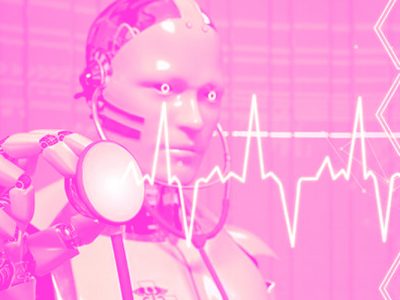
This article features the top 10 countries working to improve their AI-enabled healthcare.
The use of AI in almost all spheres of our lives is becoming increasingly crucial and inseparable. Focusing on advancement towards making our lives easier and more comfortable, by its ability of lightning speed and error-free calculations and decision-making skills, steadily more organizations are becoming receptive to the use of AI.
Similarly, the use of AI in healthcare globally is one of the most impactful transformations in the healthcare and pharmaceutical industry. Diverse countries are using such AI technologies due to their widespread applications and complexity in handling data in healthcare to achieve ideal patient outcomes and are also on the go to make it even better.
Mentioned below are the top 10 countries currently working their way in to improve the functioning of AI-enabled in the field of healthcare:
USA:
Today’s healthcare business, particularly in developed economies such as the United States, is heavily reliant on artificial intelligence (AI) to accurately anticipate a patient’s ailment faster than medical practitioners can. As a result, professionals use AI to improve the efficiency of electronic healthcare records with machine learning, deep learning, and NPL. Intelligent machines are more accurate than humans and reduce the rate of error.
CHINA:
Healthcare professionals in CHINA are widely using AI in medical imaging. With technologies like Artificial Intelligence, Machine Learning, and more, China is launching a major drive to integrate AI into health care. As part of the first stage of its big plan to embrace AI by 2020 (see “China’s AI Awakening”), the Chinese Government has asked for such technologies to assist with computerized medical diagnostics. According to reports, China’s business for AI healthcare services will reach 5.9 billion yuan (US$930 million) in 2022. There are fewer constraints on using data and new technology, and the need for automation is greater. In China, the public’s perception of AI will make it easier for the technology to thrive in medicine.
INDIA:
Several healthcare challenges are still in the early stages of technological development, each with millions of potential beneficiaries in India. Antibiotic resistance, health insurance, communicable diseases such as malaria and tuberculosis, as well as developing diseases like diabetes, and more are just a few of the many topics worth considering through the lens of today’s technology, connectivity, and artificial intelligence. To change the Indian health industry new technology must be priced for the country and created to address its limits. The best part is that AI promises to deliver just that. AI comes down to dispersing scarce expert information to a wide segment of the public by training algorithms computers to copy this knowledge if implemented appropriately.
GERMANY:
Germany is not far behind in applying AI to its healthcare sector. Ada is an AI-driven personalized healthcare platform for patients. The virtual application allows users to ask questions and describe their symptoms to a chatbot, which then provides feedback and medical advice. The application also enables the user with a follow-up remote consultation with a real doctor over text. The app also features a medical library for giving more detailed information on health management and helping in the storage & sharing of their medical records.
CANADA:
Given the rapid speed of technology in digital health technologies, particularly in regard to medical equipment, Health Canada, the department of the Government of Canada responsible for national health policy, is launching a program to adjust its approach that promotes improved access to therapeutic goods based on the needs of the healthcare system by establishing a new division under the “Regulatory Review of Drugs and Devices” initiative to allow into a more focused pre-market evaluation of digital health technologies, to adapt to constantly evolving technologies in digital health, and to respond to fast innovation cycles as it has the potential to improve the accessibility, convenience, and cost-effectiveness of health care delivery.
FRANCE:
The new healthcare act passed by the French Parliament in mid-2019 (based on the government’s ‘My Health 2022’ plan) aims to improve the country’s e-health readiness by utilizing Artificial Intelligence [AI]. Health is a priority domain, and a data center has been developed to allow for the analysis. After a lengthy delay, electronic health records [EHR] will be turned out countrywide and will serve as the foundation for several e-Health platforms, while telemedicine, which has already been strengthened by the recent launch of complete coverage by the public health system, will be expanded to include more healthcare professions.
ITALY:
MSD has created a chatbot for doctors in Italy as part of its MSD Salute program, which is driven by AI and machine intelligence. In Italy, it has already attracted a huge number of healthcare experts. Immuno-oncology is the program’s main focus. It facilitates the establishment of conversational interaction between users as an accessible and useful tool. Only registered physicians can use the MSD Italy ChatBot service, which emphasizes new outlets and touch-points with medical professionals while using new technology, including this effort.
SWEDEN:
Today, we can see the results of similar measures in Sweden: health-related statistics are open data, and an ecosystem of government and non-governmental actors is collaborating to construct “information-driven care” using data and AI. Increased use of data and AI in the design and delivery of public care services requires support from the federal government, as well as a well-developed and diversified ecosystem of actors.
Sweden’s government innovation agency Vinnova is supporting a 5-year effort to establish information-driven patient care in Sweden using AI as part of its national Vision-driven Healthcare program. By creating a dedicated innovation environment, it intends to find, stimulate, promote, and scale up effective AI applications inside Swedish public healthcare.
JAPAN:
Some of the world’s leading digital consultancies have gathered to analyze the condition of global AI, showing that Japanese companies are at the forefront of AI adoption. The Japanese government has responded by funding a massive national program to create data-driven artificial intelligence (AI) and Internet of things (IoT) technologies that will improve the efficiency and quality of healthcare services, as well as power future hospitals.
AUSTRALIA:
The Australian Government believes that AI is critical for the future of healthcare. They are investing US$19 million in revolutionary medical research projects that will use innovative applied artificial intelligence (AI) technology to improve how they prevent, diagnose, and treat a variety of diseases. The investment is basically for two initiatives that will employ artificial intelligence to enhance mental health treatment. The goal of this research is to employ artificial intelligence in healthcare to shorten the trial time and provide better treatment.



















